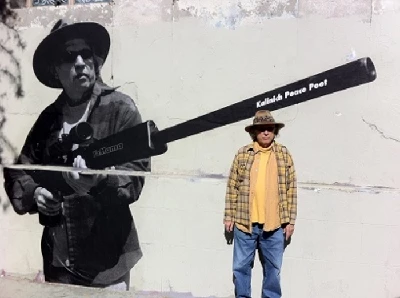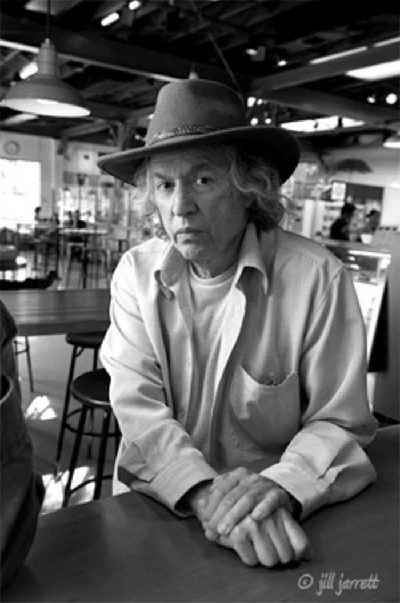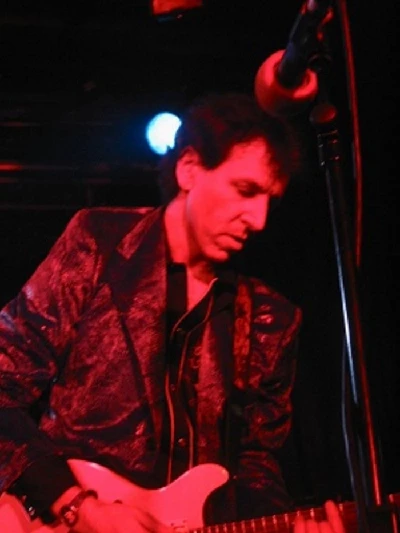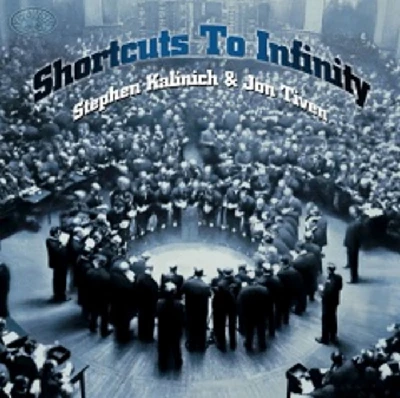published: 9 /
8 /
2012

Spoken word performer Steve Kalinich and music journalist and multi-instrumentalist Jon Tiven speak about their joint albums, ‘Symptology’ and ‘Shortcuts to Infinity’, which are being released together
Article
This September Jon Tiven and Steve Kalinich are releasing two albums, ‘Symptology’ and ‘Shortcuts to Infinity’ in a joint recording project that celebrates their strengths as collaborators, though their backgrounds in music are disparate.
Kalinich is a spoken word performer, whose deep involvement in the American anti-war movement propelled him to write poetry about world peace. In the mid1960s he began writing lyrics for the Beach Boys collectively; Dennis Wilson and Brian Wilson after the acclaimed vocalist/arranger forged his solo career at the end of that decade.
Jon Tiven, formerly a music journalist, and also a multi-instrumentalist and composer of over 400 songs, has been largely credited with igniting Big Star’s Alex Chilton’s solo career. In addition, he is a successful Nashville songwriter/producer and has written for a variety of blues and R & B performers, including BB King and Ruthie Foster.
Together Kalinich and Tiven responded to queries about their formative years, transitions into the music business and commitment to art.
PB: Jon, what was it like to write for publications like ‘Rolling Stone’ and ‘Melody Maker’ in the early days and what prompted you to move away from the field of music journalism?
JT: I enjoyed having access to people who I never would have been able to meet otherwise, musicians and people in the music business. That's how I got to be friends with Andrew Oldham, Don Covay, Brian May and a host of musical individuals who would be very influential in my life.
With editors like Jon Landau and Dave Marsh I could discuss music and learn something and maybe give them a taste of what the next generation liked. It was a tremendous time for rock---roughly 1967 through 1974 were my prime years---and there was a lot for me to be excited about.
The time came when I wanted to be more directly involved in the record making process, I figured I'd get a job at a record company and learn that end, so I went to Chess. When I realized that this wasn't a good thing to be doing if you were really interested in music, I made my exit. They made it easy---I had to move to L.A. to keep my job, and I didn't know how to drive and didn't think that was part of my game plan. I still don't drive, by the way.
PB: What was it like playing guitar with Alex Chilton in the 1970s and then being responsible for the product that came out in the studio?
JT: When he asked me to play with Big Star at Max's Kansas City, I was thrilled - all of 18 years old and playing with my favourite group (at the time) in front of a lot of press and industry honchos. I should have been incredibly intimidated, but they were all my friends, and I knew I was at the very least capable of playing my instrument. It turned out he was more intimidated than I was, but that wasn't my intention. I just wanted to support him/them.
Two years later when I produced Alex's first post-Big Star recordings (‘The Singer Not the Song’ EP, 1977 and later the ‘Bach's Bottom’ album, 1981) I was very excited to do it, but the reality was shattering. He had reached a personal and musical nadir, and I didn't realize how messed up he was until I landed in Memphis where he greeted me at the airport. His arm was in a sling, and he looked like he had just escaped from Auschwitz.
"How'd that happen?" I asked, pointing to his arm. "I went to punch Lisa in the head and I missed and hit the wall,” he responded. I didn't intend to play guitar on the record but it was obvious he wasn't going to be doing any fretwork. It was all I could do to finish enough sides that would be technically releasable, but I considered the experience to be only marginally better than a total failure.
He was pretty dry creatively, worn out, and I think rehab hadn't really taken. It was all I could do to provide as big shoulders for him to stand on as possible. I was the only one in the studio who didn't think the whole thing was headed for the same place that Alex's other solo work had gone (unreleased, likewise the 3rd Big Star album at that time), and for that I was treated with derision.
PB: As far as working with blues artists such as Johnny Winter (‘I Smell Smoke’), Buddy Guy (‘Midnight Train’) and Shemekia Copeland (‘Married to the Blues’), how long did it take you to feel comfortable writing material that you felt suited these artists’ styles?
JT: I always felt I had those kinds of songs in me, but I did not feel up-to-the-job until I met my musical Rabbi, Don Covay. Don schooled me in old school soul, R&B and the blues in a way that gave me knowledge, confidence, and growth. He was the best teacher I could have had - as a songwriter, artist, producer, and human being.
I owe him a great debt and I repay it every chance I get. I've produced an album by Don as well as a multi-artist tribute to him, and together (with my wife Sally) we wrote his most successful post-60s cover, ‘He Don't Know’, which was recorded by Huey Lewis and the News. Recently I helped with photos and liner notes on a new cd that Ace put out in the U.K. of Don's songs as sung by others called ‘Have Mercy’, and it's tremendous and I'm proud to have made my contribution to it.
PB: Your songs have been widely covered. Which artists have done the best job?
JT: It's not wise to pick favourites, but with Wilson Pickett, BB King, Jim Carroll, Don Covay, Steve Cropper, Ellis Hooks, Little Milton, Huey Lewis and Jeff Healey carrying my work to the public...how could I ask for better voices for my songs? If I'm forgetting anyone who takes offense, please forgive me; anybody who sings my songs is a friend for life as far as I'm concerned.
PB: In the first decade of the 2000s, you worked with Frank Black, PF Sloan, Felix Cavaliere and Steve Cropper. What were some of the highlights of working with these artists?
JT: Frank Black…so many highlights, so little time. A marathon session in Nashville with Ian McLagan, the former Small Faces keyboardist; Levon Helm; Bob Babbitt, the Motown bassist; Cropper; Billy Block, who was likewise in Honeycomb, and also an LA session with Steve Ferrone, who was the drummer in the Average White Band; Jim Keltner; PF Sloan, Carol Kaye and Duane Jarvis. One of my favorite times with Frank was when he took me to Hot Yoga in Memphis and now I'm a complete addict.
PF Sloan…the highlight of working with him was becoming his friend - although we were friends before we worked together - and then travelling to India (with Stevie Kalinich in tow). And then doing gigs with him, including the 40th Anniversary of Woodstock in Golden Gate Park, S.F.
Felix…writing with Felix was my favourite part of that project.
With Cropper, it was all of it. He's a great guy to be around. The tracking sessions were amazing. I got to sing (pilot vocals) in front of the greatest band I could ask for when we weren't recording Bettye LaVette, Dylan Leblanc, or Delbert. It was a pretty wonderful time to be alive, and then vocal sessions with Lucinda and Sharon Jones were incredible.
PB: Steve, your spoken word project, which Brian Wilson produced and contributed towards, included the talents of Carnie and Wendy Wilson and David Marks. After completing this project, what are your thoughts on Brian Wilson as an arranger?
SK: Brian is the most innovative and incredible arranger to work with and so much fun in the studio. At that time, he was very spontaneous and would do whatever he thought of.
For example, he brought in the nanny to sing on one track and got the dogs to bark on another. He sang background vocals into a telephone and put the earpiece of another phone next to the mic. He recorded me in a shower with the mic draped over the shower curtain rod. It was so much fun and very freeing.
PB: You wrote for Al Jardine’s 2010 ‘A Postcard from California’ album, ‘Tide Pool/Interlude’, and also ‘California Feeling’. Did Al supply the music and you the lyrics, or did you collaborate altogether?
SK: I wrote ‘California Feeling’ with Brian in the '70s. When Al was preparing to record the song, he had me come out and we talked it over. We talked about it a lot; it was collaborative in that sense. He gave it more of a gospel feel.
On ‘Tidepool’ Al and I went over the poem line by line and I taught him the phrasing. We got Alec Baldwin to do the narration and he gave it his own twist. Scott Slaughter did the music and Jardine produced it and put the whole package together.
I've stayed with Al many times over the years whenever I go to Big Sur. We've been close friends for over 40 years. He has been a big supporter of my works and let me open for him at the Henry Miller Library in Big Sur and also at the Hearst Castle.
I am extremely grateful to Al.
PB: What should the fans expect to hear on ‘Symptomology’ and ‘Shortcuts to Infinity’?
JT: I don't think expectations would do it justice. I had expectations for the record and the result outdistanced them so wildly and quickly that I was delighted...thank you Mark Linett.
SK: Honest no-holds barred critical feelings and expressions, musically and poetically.
Music that is engaging and fun and sometimes kicks you in the ass to move you toward a more full experience of life both within and outside of yourself.
PB: You both collaborated with Brian May on ‘Out of the Darkness’. Were there any surprises?
SK: For me it was an amazing experience. The length of his guitar solo was a bit of a surprise at first but I love it -- it's incredible, sizzling fun! Why not reach for the skies! It was one of my most thrilling experiences in music ever. He plays that guitar like a Stradivarius violin that was hit by electricity; the music jumps out at you, gets in your body, and you have to confront it.
The music from the guitar demands it; commands you!
JT: My biggest surprise was the enthusiasm Brian had for my vocal. He insisted on working on his guitar a little more and mixing the track himself, and I didn’t count on that at all.
PB: You have worked together on a couple of hundred songs. Can you read each other’s minds at this point? When did you figure out that you would be good collaborators?
JT: We can't read each other’s minds, that is what keeps it interesting. We figured we could write together fairly quickly, but we had to develop our friendship to the point where we could be 100% honest with each other, which took time.
SK: We clicked from our first song together, ‘Everything's Exploding’, that we wrote in India with PF Sloan, but I did not know then how exciting and stimulating it would be or how we would become one. being with two heads and sometimes different views and put both sides in a song. We disagreed some times and that was okay. We have electricity together, and we have confrontation, inspiration and harmony. Arguments, seldom.
We read each other and at times become one pulsating in a Unity that is almost indescribable and wonderful, sensitive and life affirming. We say "yes" to the music, "yes" to life.YES.
We want people to have fun and also stir them, make them move, dance, get involved in life.
PB: Discuss the fictional characters, Steve Nobody and Jack Hashtag and the reasons why you created them.
SK: They are the parts of us that we always do not express - the 20 year old's sexual, explicit, direct encounter with life. In the beginning, Stevie Nobody has a hard time with relationships. He can not hold on to girlfriends and learns to express honesty and does not try to put on false behaviours.
He wants people to accept him in all his naked, raw expressions and fall in love with that and not some unrealistic idealized self.
He is very human and feeling. He will never grow up; he lives for fun and travel. He wants to break down materialism and bring himself and other people to more spiritual goals, but still loves to party and have fun.
These characters constantly evolve. Their story is all our stories, the parts we do not express but feel. Stevie Nobody and Jack do it all.
PB: How do you jointly plan to promote the albums?
JT: I am hoping to be able to travel around the world and be worshipped and adored. That's not just my plan for promoting this album. That's basically my mission in life.
SK: Whatever it takes to promote the albums, we will do: TV and radio interviews, Q and A panels, performances - whatever.
Thank you very much.
PB: Thank you.
Picture Gallery:-



Visitor Comments:-
|
|
580 Posted By: Jon Tiven, Nashville, Tn. on 19 Aug 2012 |
in the part where I talk about the Cropper album, it was supposed to be all one sentence when I said "I got to sing (pilot vocals) in front of the greatest band I could ask for when we weren't recording Bettye LaVette, Dylan Leblanc, or Delbert." It sort of sounds like a dis to Dylan, Bettye, and Delbert the way you have it."
|
|
579 Posted By: Jon Tiven, Nashville on 18 Aug 2012 |
thanks for getting it right. No misquotes, no misspellings, I feel like we were completely represented with absolute accuracy.
|